Policy Brief: Climate Change Effects on Food System and Health in US
VerifiedAdded on 2022/08/12
|5
|1080
|13
Report
AI Summary
This policy brief examines the adverse effects of climate change on the US food system and its subsequent impact on public health, particularly among indigenous populations. It highlights the increasing health risks associated with extreme weather events, waterborne and foodborne illnesses, and vector-borne diseases. The brief identifies the indigenous population as a high-risk group due to factors like traditional food practices and non-adherence to safe water advisories. It presents a problem statement emphasizing the lack of specific healthcare policies addressing climate change-related health issues within this community. The brief proposes policy changes, including government and stakeholder involvement, funding considerations, and the development of an analytical framework to address climate drivers and human behavior influencing health outcomes. It concludes by discussing the challenges of measuring and projecting future health risks related to climate change within the US healthcare delivery system.
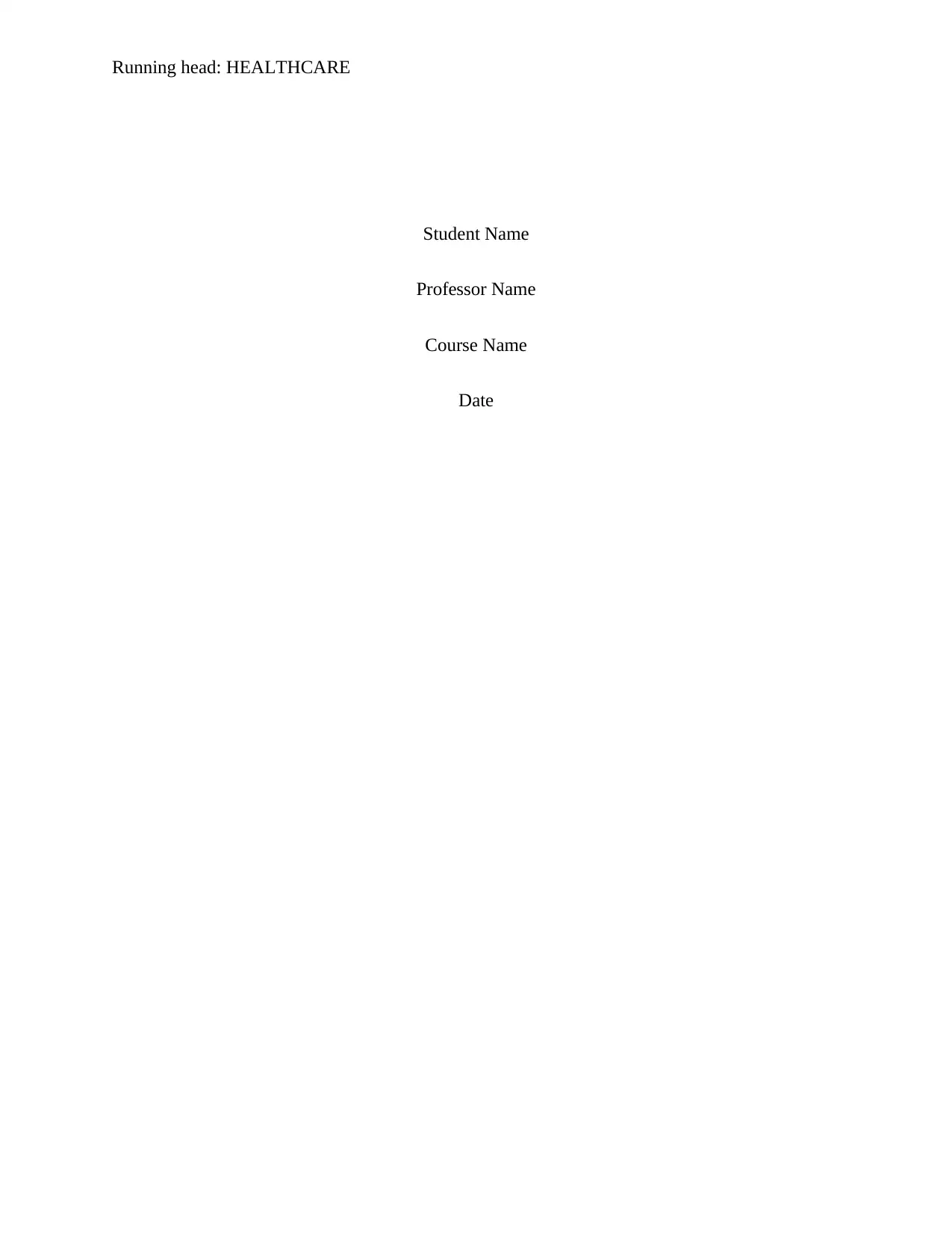
Running head: HEALTHCARE
Student Name
Professor Name
Course Name
Date
Student Name
Professor Name
Course Name
Date
Paraphrase This Document
Need a fresh take? Get an instant paraphrase of this document with our AI Paraphraser
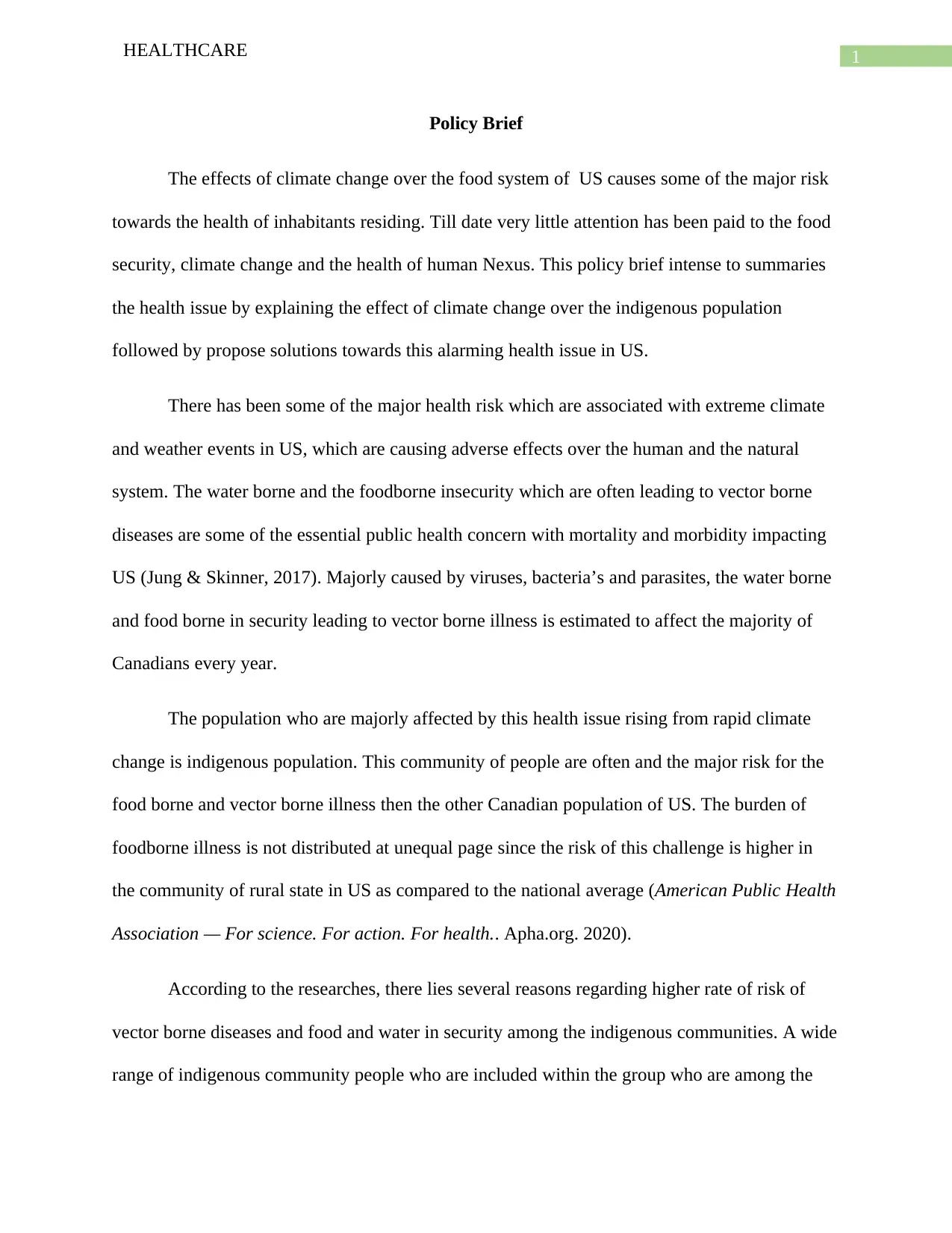
1HEALTHCARE
Policy Brief
The effects of climate change over the food system of US causes some of the major risk
towards the health of inhabitants residing. Till date very little attention has been paid to the food
security, climate change and the health of human Nexus. This policy brief intense to summaries
the health issue by explaining the effect of climate change over the indigenous population
followed by propose solutions towards this alarming health issue in US.
There has been some of the major health risk which are associated with extreme climate
and weather events in US, which are causing adverse effects over the human and the natural
system. The water borne and the foodborne insecurity which are often leading to vector borne
diseases are some of the essential public health concern with mortality and morbidity impacting
US (Jung & Skinner, 2017). Majorly caused by viruses, bacteria’s and parasites, the water borne
and food borne in security leading to vector borne illness is estimated to affect the majority of
Canadians every year.
The population who are majorly affected by this health issue rising from rapid climate
change is indigenous population. This community of people are often and the major risk for the
food borne and vector borne illness then the other Canadian population of US. The burden of
foodborne illness is not distributed at unequal page since the risk of this challenge is higher in
the community of rural state in US as compared to the national average (American Public Health
Association — For science. For action. For health.. Apha.org. 2020).
According to the researches, there lies several reasons regarding higher rate of risk of
vector borne diseases and food and water in security among the indigenous communities. A wide
range of indigenous community people who are included within the group who are among the
Policy Brief
The effects of climate change over the food system of US causes some of the major risk
towards the health of inhabitants residing. Till date very little attention has been paid to the food
security, climate change and the health of human Nexus. This policy brief intense to summaries
the health issue by explaining the effect of climate change over the indigenous population
followed by propose solutions towards this alarming health issue in US.
There has been some of the major health risk which are associated with extreme climate
and weather events in US, which are causing adverse effects over the human and the natural
system. The water borne and the foodborne insecurity which are often leading to vector borne
diseases are some of the essential public health concern with mortality and morbidity impacting
US (Jung & Skinner, 2017). Majorly caused by viruses, bacteria’s and parasites, the water borne
and food borne in security leading to vector borne illness is estimated to affect the majority of
Canadians every year.
The population who are majorly affected by this health issue rising from rapid climate
change is indigenous population. This community of people are often and the major risk for the
food borne and vector borne illness then the other Canadian population of US. The burden of
foodborne illness is not distributed at unequal page since the risk of this challenge is higher in
the community of rural state in US as compared to the national average (American Public Health
Association — For science. For action. For health.. Apha.org. 2020).
According to the researches, there lies several reasons regarding higher rate of risk of
vector borne diseases and food and water in security among the indigenous communities. A wide
range of indigenous community people who are included within the group who are among the
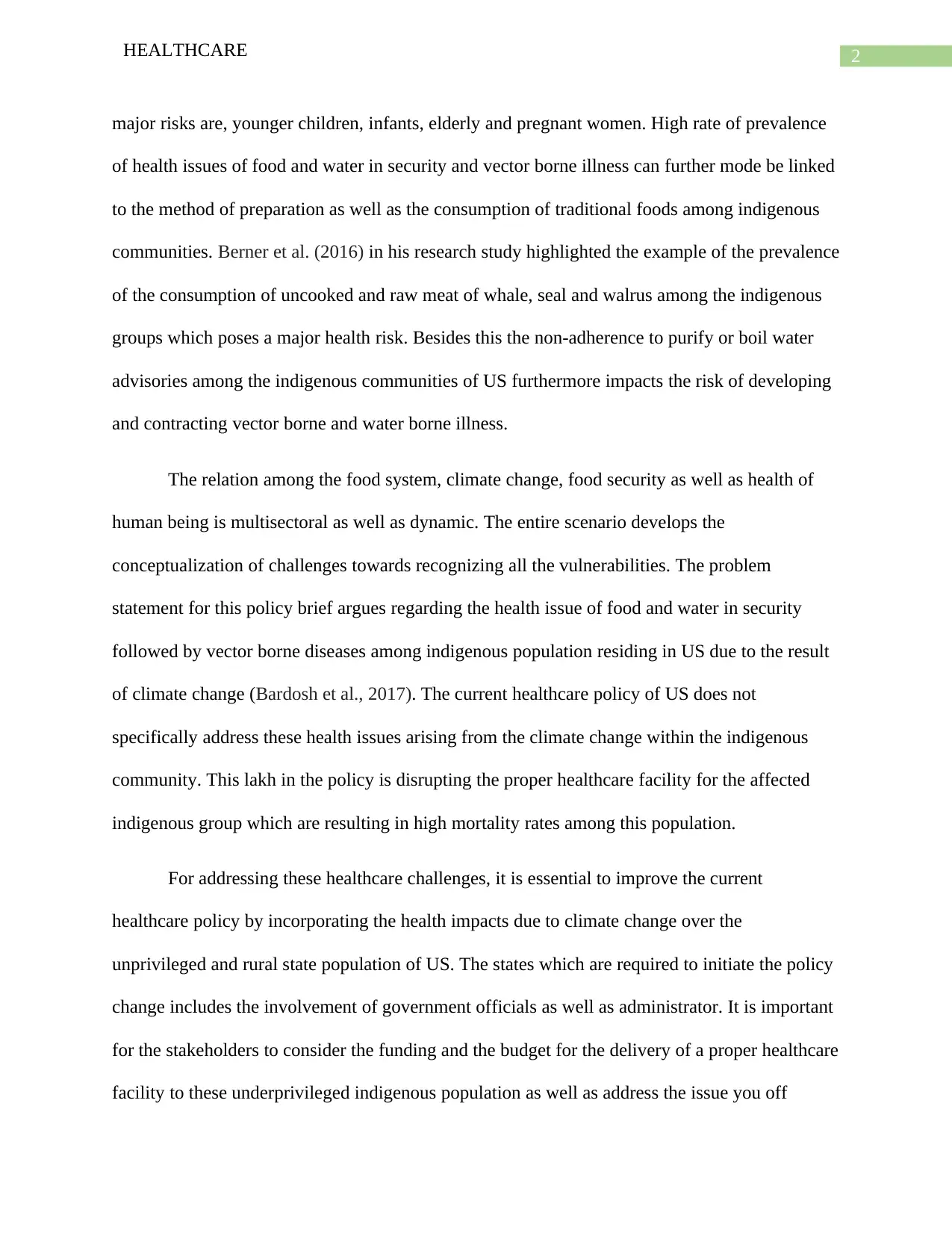
2HEALTHCARE
major risks are, younger children, infants, elderly and pregnant women. High rate of prevalence
of health issues of food and water in security and vector borne illness can further mode be linked
to the method of preparation as well as the consumption of traditional foods among indigenous
communities. Berner et al. (2016) in his research study highlighted the example of the prevalence
of the consumption of uncooked and raw meat of whale, seal and walrus among the indigenous
groups which poses a major health risk. Besides this the non-adherence to purify or boil water
advisories among the indigenous communities of US furthermore impacts the risk of developing
and contracting vector borne and water borne illness.
The relation among the food system, climate change, food security as well as health of
human being is multisectoral as well as dynamic. The entire scenario develops the
conceptualization of challenges towards recognizing all the vulnerabilities. The problem
statement for this policy brief argues regarding the health issue of food and water in security
followed by vector borne diseases among indigenous population residing in US due to the result
of climate change (Bardosh et al., 2017). The current healthcare policy of US does not
specifically address these health issues arising from the climate change within the indigenous
community. This lakh in the policy is disrupting the proper healthcare facility for the affected
indigenous group which are resulting in high mortality rates among this population.
For addressing these healthcare challenges, it is essential to improve the current
healthcare policy by incorporating the health impacts due to climate change over the
unprivileged and rural state population of US. The states which are required to initiate the policy
change includes the involvement of government officials as well as administrator. It is important
for the stakeholders to consider the funding and the budget for the delivery of a proper healthcare
facility to these underprivileged indigenous population as well as address the issue you off
major risks are, younger children, infants, elderly and pregnant women. High rate of prevalence
of health issues of food and water in security and vector borne illness can further mode be linked
to the method of preparation as well as the consumption of traditional foods among indigenous
communities. Berner et al. (2016) in his research study highlighted the example of the prevalence
of the consumption of uncooked and raw meat of whale, seal and walrus among the indigenous
groups which poses a major health risk. Besides this the non-adherence to purify or boil water
advisories among the indigenous communities of US furthermore impacts the risk of developing
and contracting vector borne and water borne illness.
The relation among the food system, climate change, food security as well as health of
human being is multisectoral as well as dynamic. The entire scenario develops the
conceptualization of challenges towards recognizing all the vulnerabilities. The problem
statement for this policy brief argues regarding the health issue of food and water in security
followed by vector borne diseases among indigenous population residing in US due to the result
of climate change (Bardosh et al., 2017). The current healthcare policy of US does not
specifically address these health issues arising from the climate change within the indigenous
community. This lakh in the policy is disrupting the proper healthcare facility for the affected
indigenous group which are resulting in high mortality rates among this population.
For addressing these healthcare challenges, it is essential to improve the current
healthcare policy by incorporating the health impacts due to climate change over the
unprivileged and rural state population of US. The states which are required to initiate the policy
change includes the involvement of government officials as well as administrator. It is important
for the stakeholders to consider the funding and the budget for the delivery of a proper healthcare
facility to these underprivileged indigenous population as well as address the issue you off
⊘ This is a preview!⊘
Do you want full access?
Subscribe today to unlock all pages.

Trusted by 1+ million students worldwide
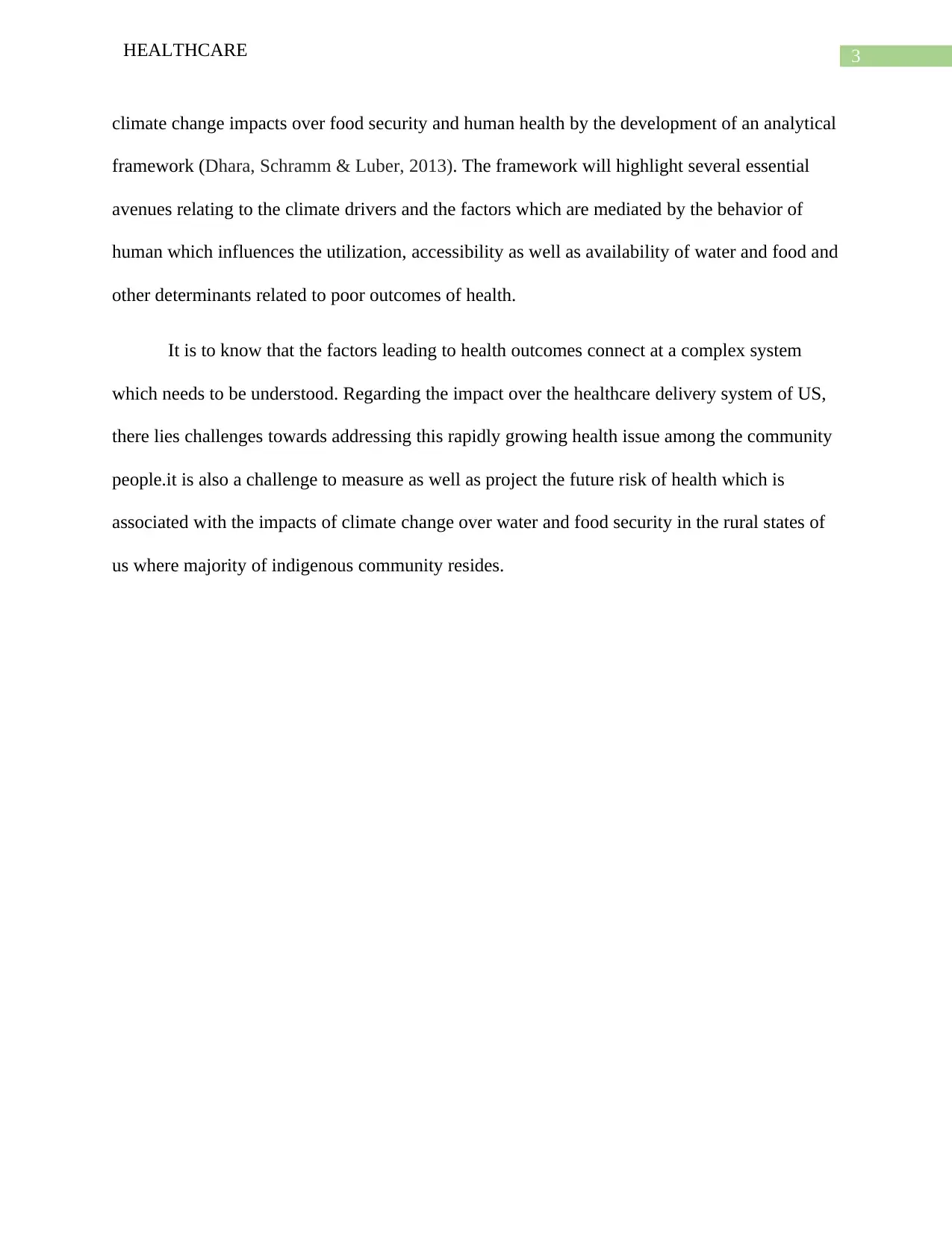
3HEALTHCARE
climate change impacts over food security and human health by the development of an analytical
framework (Dhara, Schramm & Luber, 2013). The framework will highlight several essential
avenues relating to the climate drivers and the factors which are mediated by the behavior of
human which influences the utilization, accessibility as well as availability of water and food and
other determinants related to poor outcomes of health.
It is to know that the factors leading to health outcomes connect at a complex system
which needs to be understood. Regarding the impact over the healthcare delivery system of US,
there lies challenges towards addressing this rapidly growing health issue among the community
people.it is also a challenge to measure as well as project the future risk of health which is
associated with the impacts of climate change over water and food security in the rural states of
us where majority of indigenous community resides.
climate change impacts over food security and human health by the development of an analytical
framework (Dhara, Schramm & Luber, 2013). The framework will highlight several essential
avenues relating to the climate drivers and the factors which are mediated by the behavior of
human which influences the utilization, accessibility as well as availability of water and food and
other determinants related to poor outcomes of health.
It is to know that the factors leading to health outcomes connect at a complex system
which needs to be understood. Regarding the impact over the healthcare delivery system of US,
there lies challenges towards addressing this rapidly growing health issue among the community
people.it is also a challenge to measure as well as project the future risk of health which is
associated with the impacts of climate change over water and food security in the rural states of
us where majority of indigenous community resides.
Paraphrase This Document
Need a fresh take? Get an instant paraphrase of this document with our AI Paraphraser
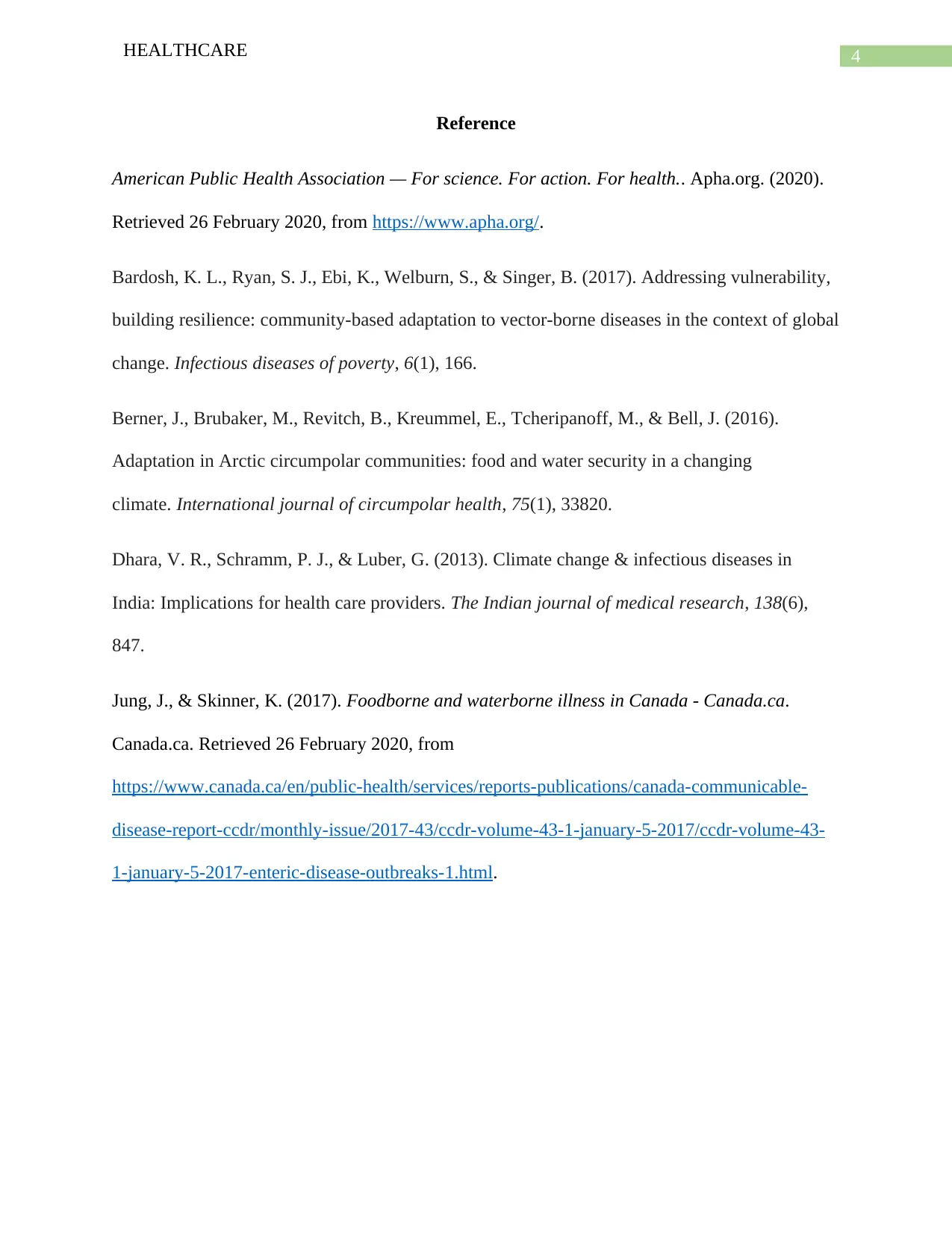
4HEALTHCARE
Reference
American Public Health Association — For science. For action. For health.. Apha.org. (2020).
Retrieved 26 February 2020, from https://www.apha.org/.
Bardosh, K. L., Ryan, S. J., Ebi, K., Welburn, S., & Singer, B. (2017). Addressing vulnerability,
building resilience: community-based adaptation to vector-borne diseases in the context of global
change. Infectious diseases of poverty, 6(1), 166.
Berner, J., Brubaker, M., Revitch, B., Kreummel, E., Tcheripanoff, M., & Bell, J. (2016).
Adaptation in Arctic circumpolar communities: food and water security in a changing
climate. International journal of circumpolar health, 75(1), 33820.
Dhara, V. R., Schramm, P. J., & Luber, G. (2013). Climate change & infectious diseases in
India: Implications for health care providers. The Indian journal of medical research, 138(6),
847.
Jung, J., & Skinner, K. (2017). Foodborne and waterborne illness in Canada - Canada.ca.
Canada.ca. Retrieved 26 February 2020, from
https://www.canada.ca/en/public-health/services/reports-publications/canada-communicable-
disease-report-ccdr/monthly-issue/2017-43/ccdr-volume-43-1-january-5-2017/ccdr-volume-43-
1-january-5-2017-enteric-disease-outbreaks-1.html.
Reference
American Public Health Association — For science. For action. For health.. Apha.org. (2020).
Retrieved 26 February 2020, from https://www.apha.org/.
Bardosh, K. L., Ryan, S. J., Ebi, K., Welburn, S., & Singer, B. (2017). Addressing vulnerability,
building resilience: community-based adaptation to vector-borne diseases in the context of global
change. Infectious diseases of poverty, 6(1), 166.
Berner, J., Brubaker, M., Revitch, B., Kreummel, E., Tcheripanoff, M., & Bell, J. (2016).
Adaptation in Arctic circumpolar communities: food and water security in a changing
climate. International journal of circumpolar health, 75(1), 33820.
Dhara, V. R., Schramm, P. J., & Luber, G. (2013). Climate change & infectious diseases in
India: Implications for health care providers. The Indian journal of medical research, 138(6),
847.
Jung, J., & Skinner, K. (2017). Foodborne and waterborne illness in Canada - Canada.ca.
Canada.ca. Retrieved 26 February 2020, from
https://www.canada.ca/en/public-health/services/reports-publications/canada-communicable-
disease-report-ccdr/monthly-issue/2017-43/ccdr-volume-43-1-january-5-2017/ccdr-volume-43-
1-january-5-2017-enteric-disease-outbreaks-1.html.
1 out of 5
Related Documents
Your All-in-One AI-Powered Toolkit for Academic Success.
+13062052269
info@desklib.com
Available 24*7 on WhatsApp / Email
![[object Object]](/_next/static/media/star-bottom.7253800d.svg)
Unlock your academic potential
Copyright © 2020–2026 A2Z Services. All Rights Reserved. Developed and managed by ZUCOL.




